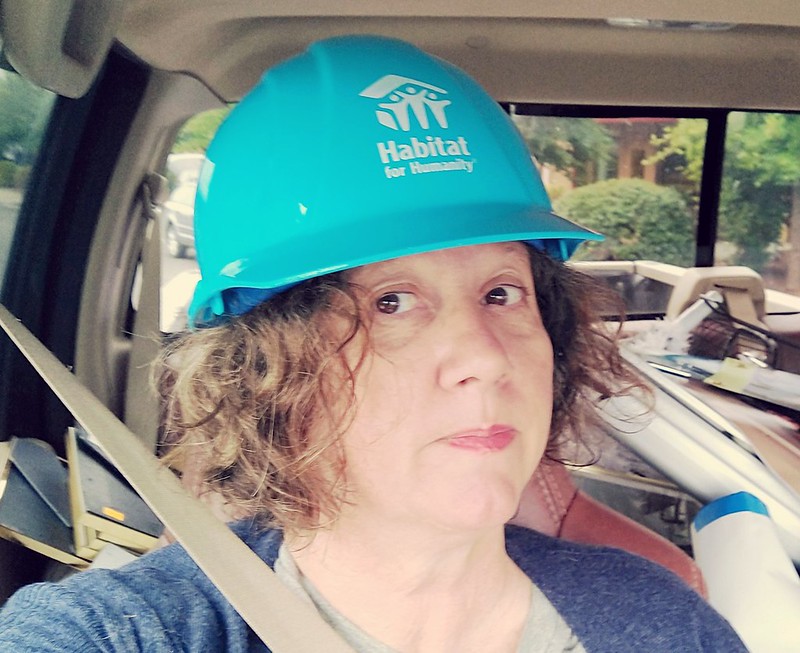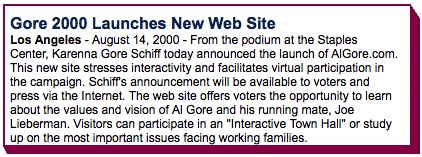Since August 2022, I have been working the equivalent of two full days a week, sometimes a bit more, for a local affiliate of Habitat for Humanity International. I’ve been working in marketing and outreach, primarily social media and web site content, and also for three months, I helped onboard volunteers for home builds and home repairs, as well as looking at the volunteer onboarding, support and tracking processes at the Restore, Habitat’s thrift store, and making recommendations to make them better.
My primary goal in my job is to increase local awareness about this Habitat affiliate’s efforts to address affordable housing and about its efforts to help vulnerable homeowners with critical home repairs that allow them to stay in their homes. I also have a focus on increasing sales of the affiliate’s ReStore, which is a vital funding component for the local affiliate, as well as increasing awareness of the ReStore regarding its connection to Habitat for Humanity and as a recycle and reuse option. I would also like to see a LOT more diversity among Habitat’s volunteer engagement, and that’s going to require special, targeted efforts in messaging – putting a lot of my own recommendations to the test. I manage the Habitat affiliate’s web site and the local ReStore web site, and you can see examples of my online outreach via the affiliate’s Facebook and Instagram pages, the local ReStore Facebook and Instagram pages, and the affiliate’s Mastodon, Twitter and Reddit accounts.
It’s been a fascinating, challenging experience. I’ve long been a fan of Habitat for Humanity’s model for engaging volunteers in home construction, as you know if you have attended my workshops related to volunteer engagement. Getting this behind-the-scenes look at all the various aspects of Habitat’s programming, which goes well beyond building structures, has been fantastic and inspiring. It’s also so wonderful to be in a small, frontline nonprofit, especially one serving a largely rural community: the affiliate serves a large, mostly rural area of less than 400 sq miles / 940 km2, much of it unincorporated and outside the Portland Metro Urban Growth Boundary (UGB), which bisects Washington County. The overall population of the area served by this affiliate is less than 50,000. The three argest cities in the service area have populations of about 26,000 people, about 13,400 people and about 3500 people, respectively. More than 10 percent of the population identifies as Hispanic or Latino.
In the time I have been at this Habitat for Humanity affiliate, here are some things I’ve learned – or relearned:
- There’s nothing like testing your recommendations made as a consultant in real-world settings. It’s one thing to write a blog or a book or hold a training; it’s another to actually apply those strategies yourself. I’ve always been proud to be able to tie what I recommend in a workshop to what I’ve actually done.
- Working with people in rural Oregon really isn’t that different from working with rural people in Afghanistan: people want a safe, stable place to live, most especially a place of their own, and in most cases, if you give them the opportunity to work for that, they’ll embrace it – and their neighbors will help. Political and economic obstacles in nonprofit work are shockingly similar across countries.
- Some of the most important work you do as a communications manager is getting what people know in their heads into a form that can be read and referenced by others. Often, employees aren’t that aware of all their fellow employees are doing. When a key employee or volunteer leaves, and their work and knowledge isn’t documented, it can bring some work to a standstill. Plus, what is in people’s heads and what they experience in their work is fantastic for blogs and grant proposals.
- The people with whom most customers interact should be regularly briefed on program activities, on upcoming events and on important dates. The cashiers of the ReStore regularly get questions about Habitat programming from customers, and since my office is right next to checkout, if the cashiers don’t know the answer, they will grab me to talk to the customers with questions, something I welcome. And they listen to what I say and sometimes comment later, “I didn’t know any of that.” Everyone is a spokesperson for your nonprofit, whether you like it or not. I’m now working to make sure they know how to answer our organization’s most frequently asked questions, and how to direct people who need detailed answers. I’m working to make sure they know they can use their smart phones to pull up our organization’s web site, right then and there, and read answers to customers with questions. Have a look at When some nonprofit employees & volunteers don’t really understand what the nonprofit is trying to address & why for more on what I suggest to ensure everyone is representing your nonprofit appropriately.
- Just because you work for an agency with a well-known name does not mean people really know what it does (including some employees and board members!). So many people think Habitat for Humanity gives away houses – it doesn’t (it partners with families for affordable mortgages – the families DO make payments for the house). I didn’t know Habitat did critical home repairs for vulnerable home owners until I started working there.
- Online tools aren’t enough to market an organization: executive directors and board members have to get out into the communities. You have to show up at the big events of other organizations. You have to present to city councils and county governments. You have to immediately respond to every call from the media – especially in this age of fewer and fewer newspapers, and fewer local radio stations and TV stations. You have to leverage banner placements over key streets and doorways, buy ads in newspapers (if you are lucky enough to still have a newspaper), put flyers up at grocery stores, and rely on other marketing tools many said would go away with the Internet. You have to be at farmer’s markets and the super popular food cart pod on a Friday night. And the opposite is true too: just going to onsite events and relying on traditional paper postal mail and onsite displays isn’t enough; you have to regularly use and update online tools.
- People love social media posts that have photos of LOCAL PEOPLE in them. You can, therefore, never have enough photos of local volunteers and employees “in action.”
- People also love social media that’s fun. And dinosaurs are terrific props.
- Bureaucracy can be wonderful. Rules, regulations, protocols, official messaging – these are NOT automatically bad. Official policies and procedures MATTER because when they are based in reality, understood and followed, it keeps everyone on the same page and it prevents missteps. I loved that, at the United Nations, I could always find the policy, the manual, the official statement, that I could use to justify something I wanted to say or do. The same has been true of Habitat: their official policies regarding communications, safety and volunteer engagement have made my job easier! And what a joy to see Susan Ellis, my mentor and guru, quoted in Habitat’s official guidance for staff regarding volunteer engagement. It’s also been great not to have to agonize over how to phrase something – I can usually find exactly what I need in official Habitat materials, some public, some on our extensive national intranet/knowledge base.
- People don’t like change. I’ve known this for years, and I’m relearning it yet again. And if I hear, “But that’s the way we’ve always done it” one more time…
- There is a delicate, difficult balance in an organization that fights poverty hosting a gala event.
- Contacting TV stations an hour away 48 hours before an event can sometimes get them to cover it during a slow news week. It’s always worth trying.
- I’m not the only over-40 woman in my area that has so much professional experience I scare potential employers when I apply for jobs – and it’s amazing how many Generation Xers I’m now encountering on their third or fourth careers.
- It’s still not easy to create group volunteering roles – things that three or more volunteers could do together, just once (though it’s usually 10 or more people). The agency could have three of these every month and not meet volunteer demand.
- People are willing to travel outside of their area to volunteer for a day. As noted earlier, I’m in a county that’s half rural and half urban. The Habitat that serves the urban area can’t as easily accommodate groups of volunteers, or specialized volunteers, as we can, so we end up with volunteers from the opposite side of the county, often from groups of employees from very large employers – and that’s fine with us!
- As I wrote on a blog in 2016 called “If no one is complaining, we don’t have to change how we do things”, “Often, when I do a little digging myself, talking to people that wanted to volunteer at the organization but didn’t, or to current members, or to former clients, and on and on, I find that, indeed, there is dissatisfaction among a few, maybe even more, but no one says anything to the organization itself… they don’t say anything about something they would like to see changed or improved because there is a culture within the program or the entire organization, that discourages complaints or suggestions.” No further comment.
- Everyone that works with volunteers should have some training on how to work with volunteers. Period.
- It’s so still oh-so-easy to recruit volunteers for online tasks and onsite, short-term roles. People are so, so hungry for those kinds of roles! I remain confused by people who struggle to recruit volunteers for short-term roles or online roles. I’ve put up three such assignments VolunteerMatch and had to take them down in just a few days because I had enough great volunteers to do them. I’ve recruited online volunteers to update our contact list of every community of faith and every nonprofit in the area, as well as to update our list of and contact information for every elected official that represents any part of our area. It’s not too late for you to get up-to-speed on virtual volunteering!
- It’s really hard to recruit new volunteers for longer-term, ongoing roles, and people under 50 have zero interest in coming to a ReStore even twice a month to help in an ongoing role. And that’s not a criticism of these generations – I think they would volunteer if we built a relationship with these folks, if we enticed them with short-term gigs and gave them a really worthwhile experience.
- Online sales requires a dedicated staff member who can spare the role several hours of every week – it can’t be done as a simple add-on to an existing role, something attended to just a few minutes a day.
- Bicycling to work is awesome except when it’s icy outside. Just like in Germany! But it’s brutal in the increasingly over-headed summers we now get.
This experience has also affirmed my belief that, if you want to work abroad in humanitarian endeavors, you need deep experience working for nonprofits in your own community, as an employee, consultant or volunteer. And any Habitat for Humanity affiliate and its ReStore are great places to start.

If you have benefited from this blog, my other blogs, or other parts of my web site and would like to support the time that went into researching information, developing material, preparing articles, updating pages, etc. (I receive no funding for this work), here is how you can help.






 For the present day:
For the present day: